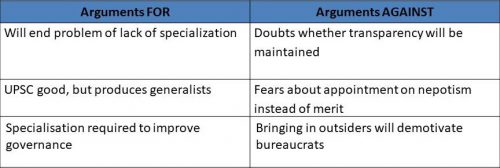By Jill Mehta
The department of personnel and training has invited applications from Indians with expertise in various sectors such as revenue, financial services, economic affairs, agriculture, infrastructure and commerce at Joint Secretary (JS)-level post for a tenure of 3 years which can be extended up to 5 years based on performance. This is not the first move where specialists are brought in; earlier, too, lateral hiring has been resorted to at the secretary level, but this time the openings are for the crucial post of Joint Secretary-level.
The pay scale of a Joint Secretary is from Rs 1.44 lakh to Rs 2.18 lakh per month, plus perks like government accommodation and vehicle.
This move has attracted several opinions from experts, some positive, but more negative.
Influence of Private sector
There is a fear that the larger businesses may push their own men in the government and try to control the government decisions. While some politicians from the opposition have also publically stated that the 10 recruits have already been selected and this whole advertisement for lateral hiring is a façade.
No long term stake, IAS officers side-lined
The lateral recruits may not bring in many benefits because their period is limited; hence, there is a fear that they might serve someone else’s purpose, which again questions their fairness and stake in the government.
Former health secretary, Desiraju, said, “I think the question to ask is – what is the problem you are trying to solve. One answer to that could be that we need subject matter specialization and much better professional skills at the level of JS. But then, one may ask whether getting an outside person is the best way of filling that gap. It is not that a service officer coming at the level of JS is bringing no skills at all. An IAS officer who joins the government of India brings the knowledge of how state governments work, how field-level implementation of subjects in the state list of the Constitution – healthcare, primary education, revenue management and law – works. Officers learn work in their state cadre. They bring in this experience at the level of policy-making positions.”
Over stepping UPSC exam system
The question is why has the current UPSC system been partially left out even though it has worked all these years and built itself to be a robust system? It raises questions and undermines the current bureaucrats for their performance since the past 4 years of Modi Government.
Private sector appreciates the move
It seems to be a win for private sector employees who want to enter the government. And Joint Secretary being one of the most important positions is likely to attract great talent.
“Niti’s experience with lateral entry has been extremely good. They bring in a vast number of fresh and vibrant ideas. This move in Govt. was long overdue and I welcome it. Will catalyse UPSC entrants to specialise. Govt. must also allow deputation of its officers to private sector as well,” tweeted Amitabh Kant, chief executive officer of Niti Aayog.

What next?
The lateral hiring is a pilot project and some say that if it doesn’t do any good it can always be changed or scrapped. Overall the change is welcome but the government needs to be more transparent in the whole recruitment drive and needs to make sure that the system is not dominated with disguised individuals poised to make decisions which do well only to a few companies or people.
Disclaimer: The opinions expressed in this column are that of the writer. The facts and opinions expressed here do not reflect the views of IndusGuru Network Partners
Nice thoughts and conclusion Jill. Keep it up.!